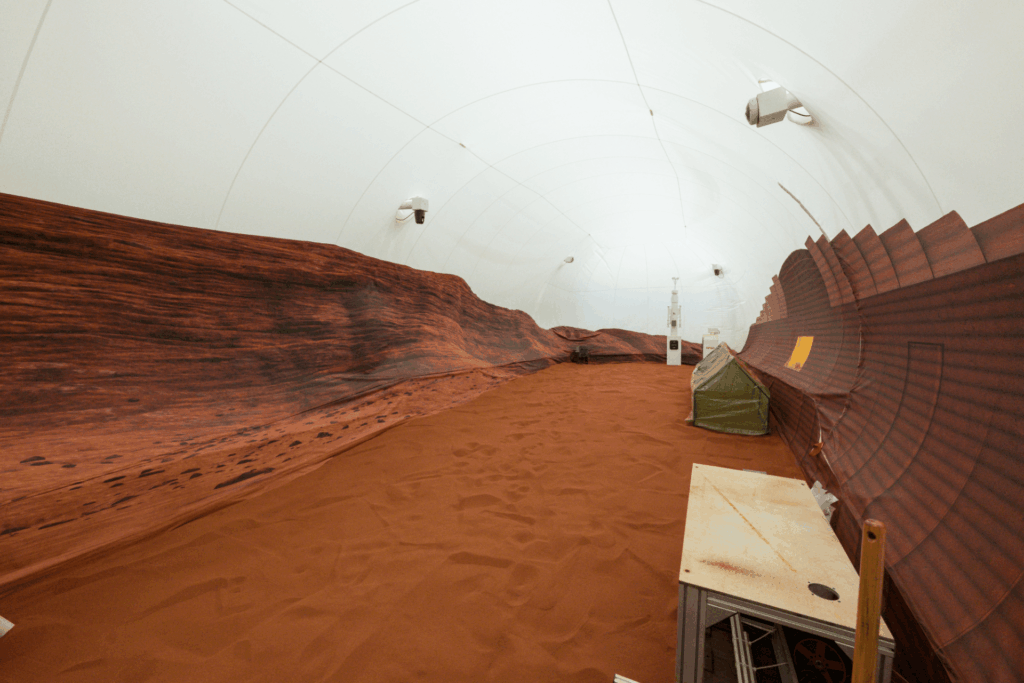
Four research volunteers are set to embark on a groundbreaking year-long Mars mission simulation at NASA’s Johnson Space Center in Houston. This mission, beginning on October 19, 2023, aims to provide critical data that will shape future human exploration of the Moon, Mars, and beyond.
The selected crew members—Ross Elder, Ellen Ellis, Matthew Montgomery, and James Spicer—will inhabit the 1,700-square-foot Mars Dune Alpha habitat, living and working like astronauts for 378 days. Their mission will conclude on October 31, 2026. Emily Phillips and Laura Marie will serve as alternate crew members, ready to step in if needed.
CHAPEA: Preparing for Mars
The mission is part of NASA’s CHAPEA (Crew Health and Performance Exploration Analog) initiative, which conducts Earth-based simulations to evaluate human health and performance factors crucial for Mars missions. The crew will face challenges such as resource limitations, equipment failures, communication delays, and isolation, simulating the high-pressure environment of space exploration.
Sara Whiting, project scientist with NASA’s Human Research Program, emphasized the importance of these simulations, stating,
“As NASA gears up for crewed Artemis missions, CHAPEA and other ground analogs are helping to determine which capabilities could best support future crews in overcoming the human health and performance challenges of living and operating beyond Earth’s resources – all before we send humans to Mars.”
Mission Objectives and Activities
During the simulation, crew members will engage in scientific research and operational tasks, including simulated Mars walks, growing a vegetable garden, and conducting robotic operations. They will also test technologies designed for Mars and deep space exploration, such as a potable water dispenser and diagnostic medical equipment.
Grace Douglas, CHAPEA principal investigator, highlighted the mission’s goals:
“The simulation will allow us to collect cognitive and physical performance data to give us more insight into the potential impacts of the resource restrictions and long-duration missions to Mars on crew health and performance. Ultimately, this information will help NASA make informed decisions to design and plan for a successful human mission to Mars.”
The Human Research Program
This mission is the second one-year Mars surface simulation conducted through CHAPEA, with the first concluding on July 6, 2024. NASA’s Human Research Program is dedicated to developing methods and technologies to support safe and productive human space travel. Through applied research in laboratories, simulations, and aboard the International Space Station, the program investigates the effects of spaceflight on human bodies and behaviors to ensure astronauts remain healthy and mission-ready.
Meet the Crew
Primary Crew
- Ross Elder, Commander: A major and experimental test pilot in the United States Air Force, Elder has extensive experience with military aircraft, including the F-35 and F-15E/EX. He holds advanced degrees in astronautical and mechanical engineering.
- Ellen Ellis, Medical Officer: A colonel in the United States Space Force, Ellis has a background in aerospace engineering and emergency management. Her work includes fielding modernized data centers for the National Reconnaissance Office.
- Matthew Montgomery, Science Officer: A hardware engineering design consultant, Montgomery specializes in LED lighting, robotics, and controlled environment agriculture. He holds degrees in electrical engineering.
- James Spicer, Flight Engineer: With a background in aerospace and defense, Spicer has contributed to satellite communications networks and spacecraft design. He holds degrees in aeronautics and astronautics from Stanford University.
Alternate Crew
- Emily Phillips: A captain and pilot in the United States Marine Corps, Phillips is an experienced F/A-18C Hornet pilot with deployments to Europe and Southeast Asia.
- Laura Marie: A commercial airline pilot, Marie specializes in flight safety and has amassed over 2,800 flight hours. She is dedicated to mentoring aspiring pilots.
The announcement of this mission comes as NASA intensifies its efforts to prepare for crewed Artemis missions and eventual human exploration of Mars. The data collected from CHAPEA will be instrumental in ensuring the safety and success of these ambitious endeavors.







